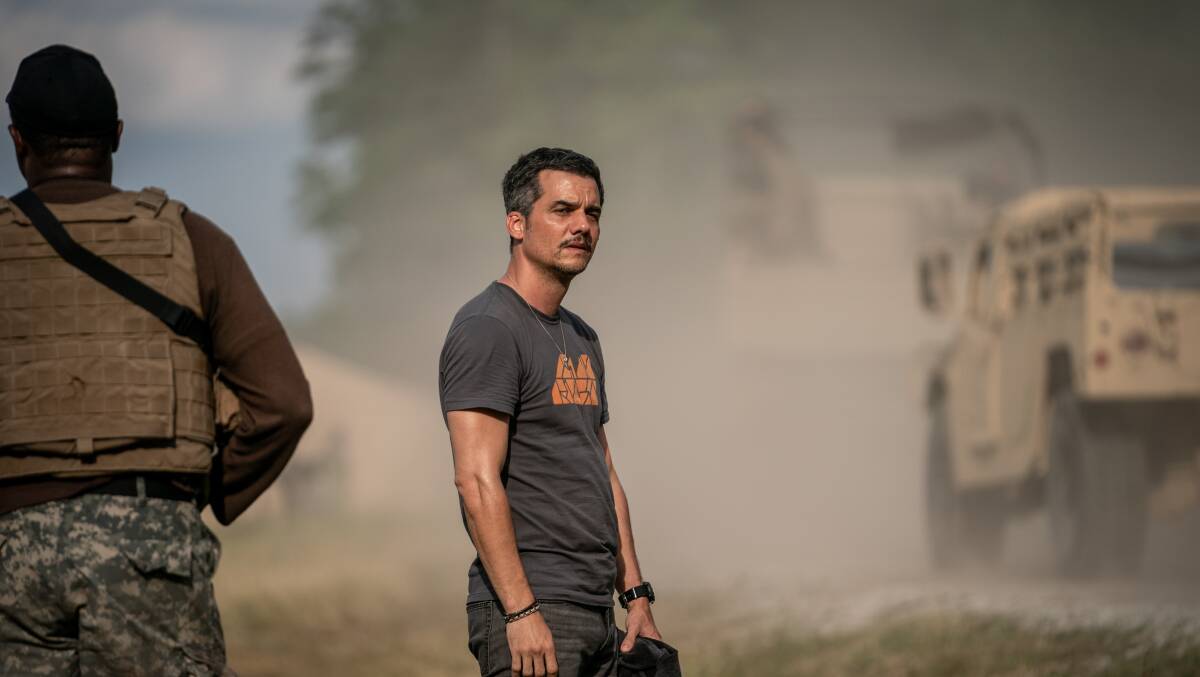Civil War.
MA15+. 109 minutes.
Five stars.
Back in 2002, Alex Garland and his filmmaking mates Danny Boyle and Andrew MacDonald shut down the streets of London to shoot scenes for their zombie apocalypse movie 28 Days Later.
It must have been logistically tricky but the scenes of a dazed Cillian Murphy crossing a deserted Westminster Bridge, his character awoken from a coma to find his city, and the world, had gone to hell are gobsmacking.
But it turns out that all of that was just a dress rehearsal for Alex Garland for the day when he, 22 years later, would be staging scenes of an America experiencing its own apocalypse in Civil War, his raw and astounding new film.
Kirsten Dunst plays a jaded and famed photojournalist Lee Smith who is teamed up on assignment with her Reuters colleague Joel (Wagner Moura). They're planning to leave the war-torn streets of New York and head south to Washington, DC. hoping to score an interview with the now three-term president (Nick Offerman).
We never really learn how the president has managed to lead the United States of America into a divided and broken nation, with Texas and California having seceded and taken their financial resources with them and the remainder of the country in a civil strife the government is losing.
But reporter Joel wants to score that interview, and joining him on the ride from the assorted press pool holding up in a New York hotel are veteran journalist Sammy (Stephen McKinley) and a very green wannabe photographer Jessie (Cailee Spaeny).
The plan is to call past the war's current front line in the Carolinas, file some stories and leave Sammy and Jessie somewhere safe before Lee and Joel head into the dangerous remnants of the American capital.
But it is a long and dangerous ride through an America where it is impossible to tell which side is "good" and who might be on that side, and where a wrong turn in the road might introduce them to the end of somebody's gun.
Garland's achievement with Civil War is impressive in execution, taking the seed planted in the mind of every viewer of that January 6 Capitol riot footage to its most frightening future scenario.
One hopes its American consumers take this film as the cautionary tale Garland clearly intends.
He constructs the film, probably for affordability, on the mostly small scale, as a road movie where four journalists move from safe stops to capturing stories breaking around them.
This gives Garland the canvas to paint a number of smaller pictures amongst the grander war-torn tableau.
It is a film about journalism, with these four professionals in there among raw, bloody fighting. It is also a film about photography and the responsibility the photojournalist has to immortalise these naked and honest moments. It is this idea that really grabs you.
Dunst is so exhausted and broken as the older photojournalist drained long ago of her empathy, and yet taking the time to mentor Spaeny's barely post-teen Jessie.
Through their eyes, we're right there at ground level, along with Garland's camera, for Pol Pot-like killing fields in green Carolina farm fields, or among hand-to-hand combat on city streets.
The camerawork can be nauseating at times - that's intentional - the sound design deafening and engineered to make you jump a few times, the production design epic.

The film culminates in a final epic battle on the inner streets of Washington, DC. that are Saving Private Ryan level of immersive.
It's all very impressive, Garland knows exactly what he's doing, and he has a stellar cast who are all so strong.

